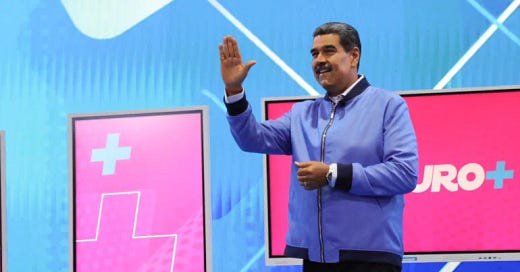Venezuela’s ruling Partido Socialista Unido de Venezuela (PSUV) formally nominated President Nicolás Maduro as its candidate in the upcoming July presidential elections. He has been widely expected to run for reelection.
If Maduro wins, it would be his second reelection, though the 2018 vote that granted him a second six-year term was widely considered fraudulent, notes France 24.
In recent months the government has stepped up repression of critical voices, not just opposition leaders, but also independent media, civil society and “former allies: other left-wing parties and labor movements,” writes Tony Frangie-Mawad in Foreign Policy.
The leading opposition challenger, María Corina Machado, has been banned from running by a government-loyal court, despite an agreement signed last year in Barbados that aimed at creating conditions for a democratic election.
Venezuela’s opposition faces some tough choices ahead of the July 28 vote, writes Geoff Ramsey at the Atlantic Council. “Venezuela’s opposition has three difficult choices: It can boycott the election. It can risk a deep fracture in its coalition. Or it can name a replacement candidate. So far, it is likely to run a “plan B” candidate in the unfair process, but the challenge will be moving forward with this plan while maintaining a united front.”
A possible strategy would be for Machado to name a trusted replacement, who if successful could appoint her vicepresident and resign. Though difficult, “this strategy would allow Machado to cement her image as not just a candidate, but as the leader of a broad and diverse majority of Venezuelans working to restore the country’s democratic institutions,” according to Ramsey.
More Venezuela
U.S. intelligence agencies predict that Maduro will likely win in this year’s July presidential election, according to their latest assessment of threats to the United States’ national security, reports the Miami Herald.
Iran and Venezuela are trying to patch together an oil alliance that began to fray last year, according to Reuters. The cooperation will be crucial for Venezuela’s fuel supply ahead of the expected reinstatement of U.S. oil sanctions next month.
Former Venezuelan general Cliver Alcalá ,who twice tried to mount coups against Maduro, is awaiting awaiting sentencing tomorrow on unrelated U.S. federal charges of providing weapons to drug-funded rebels that could put him in jail for up to 30 years, reports the Associated Press.
Migration
The millions of Venezuelan migrants who have fled their country since 2015 are having a positive effect on the economies of their host countries across Latin America and the Caribbean, according to a report by the UNHCR, IDB and OECD. (Conversation)
The U.S. expects a wave of migration for Haiti, spurred by the country’s increasingly intense security crisis, reports Politico.
Brazil
Brazilian President Luiz Inácio Lula da Silva’s climate leadership ambitions are clashing with a planned increase of state oil production that would make Petrobras the world’s third-largest producer by 2030, reports the New York Times.
Lula wants to expand agriculture exports to India and Africa, focusing more on new markets as an agreement between Mercosur and the EU languishes, reports Bloomberg.
Colombia
Colombia’s Supreme Court selected the nation’s new attorney general, Luz Adriana Camargo, a seasoned prosecutor with few political ties, according to the Associated Press. Predecessors have been criticized for favoring political allies and deploying criminal investigations for political ends.
Camargo is set to direct several delicate investigations, including a probe into accusations of illegal financing in President Gustavo Petro’s 2022 presidential campaign, reports Al Jazeera.
Haiti
Kenya put a multinational security mission to Haiti on hold, as Haitian politicians scramble to put together a transition government to usher the country to elections, reports the Washington Post.
An international group led by CARICOM, with the U.S. and the United Nations participating, gave Haitian leaders 24 hours to come up with a council with seven voting members and two non-voting members serving as observers, reports the Miami Herald.
Political actors are negotiating behind closed doors — a process that “was met with criticism both abroad and in Haiti, where many people denounced a lack of transparency that smacked of international meddling and backroom deal-making,” reports the New York Times.
Mexico
Two detectives involved in the investigation regarding the 43 Ayotzinapa students who were disappeared nearly 10 years ago have been found unharmed, two days after they themselves disappeared in Mexico’s Guerrero state, reports the Associated Press.
Critter Corner
Researchers discovered a new frog species in Brazil that builds foam nests — Miami Herald.






